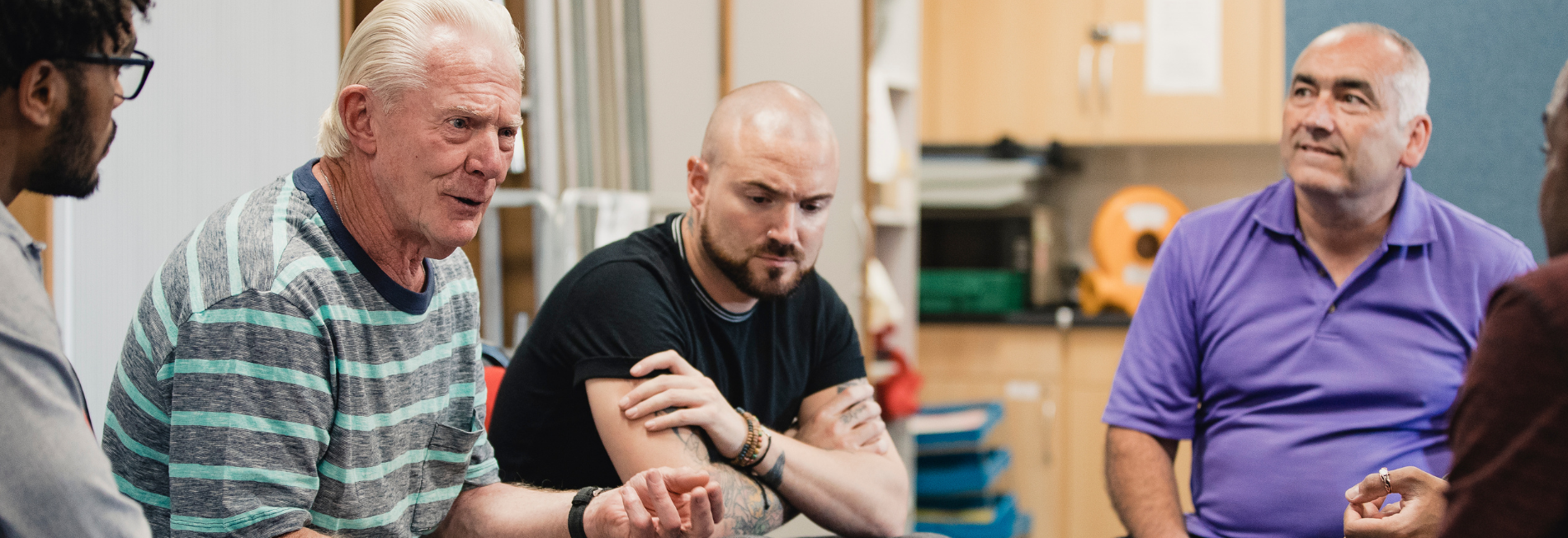Group Therapy Services
Shared Journeys, Collective Healing
Group therapy provides a unique and collaborative approach to addressing various mental, emotional, and behavioral challenges. In a group therapy setting, individuals with similar concerns come together to share their experiences, gain insights, and receive support from both a trained therapist and their peers. This therapeutic environment offers a sense of belonging and shared understanding, helping participants feel less alone in their struggles.
Group members work together to explore topics such as communication, coping strategies, relationship dynamics, and personal growth. Group therapy fosters empathy, encourages self-expression, and promotes positive change through the exchange of ideas and feedback within a safe and confidential space. It is a powerful and effective means of personal development and emotional healing.

Supportive Circles for Positive Change
ADHD Parents Support Group
ADHD Parents Support Group
SERVICES
ADHD Parents Support Group
Our ADHD Support Group is a collaborative gathering for parents and caregivers of children with Attention Deficit Hyperactivity Disorder (ADHD). Led by experienced professionals, this group provides a supportive environment to learn about ADHD, share experiences, and gain valuable resources to help your child thrive. The group focuses on understanding the science behind ADHD and equipping participants with practical strategies for managing symptoms and promoting positive development.
Get in Touch
![]()
Call us
(571) 645-2222


What is the ADHD Parents’ Support Group?
The ADHD Support Group for Parents and Caregivers is a specialized program designed to empower and educate those caring for children with ADHD. In this supportive environment, you can expect:
- Education: Learn about the latest scientific research on ADHD, including its causes, symptoms, and treatment options.
- Peer Support: Connect with other parents and caregivers who understand the unique challenges of raising a child with ADHD, reducing feelings of isolation and frustration.
- Resource Sharing: Gain access to a wealth of resources, including recommended books, websites, and local services that can support your child’s development.
- Skill Development: Acquire practical strategies for managing ADHD symptoms, improving communication, and fostering your child’s strengths.
- Expert Guidance: Benefit from the knowledge and experience of professionals specializing in ADHD management and child development.
- Emotional Support: Share your experiences in a non-judgmental environment, fostering emotional growth and resilience.
- Problem-Solving: Collaboratively work on finding solutions to common challenges faced by families affected by ADHD.
- Confidentiality: Participate in a safe and trustworthy environment where all members respect each other’s privacy.
Our ADHD Support Group addresses a wide range of topics, including medication management, behavioral interventions, educational accommodations, and social skills development. By participating in this group, you’ll gain the knowledge, skills, and support needed to navigate the complexities of ADHD and help your child reach their full potential.
How Does the ADHD Support Group Help?
The ADHD Support Group offers numerous benefits to parents and caregivers:
- Increased Understanding: Gain a deeper comprehension of ADHD, its impact on your child, and effective management strategies.
- Improved Parenting Skills: Learn and practice specific techniques for supporting your child’s unique needs, enhancing your parenting effectiveness.
- Reduced Stress: Share your experiences and challenges with others who understand, helping to alleviate stress and feelings of isolation.
- Access to Resources: Discover valuable resources and services that can support your child’s development and your family’s well-being.
- Enhanced Advocacy Skills: Learn how to effectively advocate for your child’s needs in educational and healthcare settings.
- Emotional Support: Receive empathy and encouragement from peers who are on similar journeys, fostering emotional resilience.
- Improved Family Dynamics: Gain insights into managing family relationships and promoting positive interactions with your child with ADHD.
- Networking Opportunities: Connect with other families and professionals in the ADHD community, building a supportive network.
- Empowerment: Develop confidence in your ability to support your child and navigate the challenges associated with ADHD.
Our ADHD Support Group provides a structured and supportive environment where parents and caregivers can learn, grow, and connect. By participating in this group, you’ll gain the knowledge, skills, and support needed to effectively manage ADHD symptoms, promote your child’s strengths, and foster a positive family dynamic.
Related Conditions
- ADHD
- Anger Management
- Anxiety
- Behavioral Issues
- Bipolar Disorder
- Chronic Impulsivity
- Coping Skills
- Depression
- Education and Learning Disabilities
- Emotional Dysregulation
- Life Coaching
- Life Transitions
- Parenting
- School Issues
- Stress
Kids Play Therapy Group
Kids Play Therapy Group
SERVICES
Kids Play Therapy Group
Kids Play Therapy Group is a specialized form of therapy for children aged 4 to 12. It uses play-based activities and peer interactions in a structured and supportive environment to help children express emotions, develop social skills, and address behavioral or emotional issues. A trained therapist guides the sessions, fostering a safe and trusting atmosphere for children to explore their feelings and challenges.
Get in Touch
![]()
Call us
(571) 645-2222

What is Kids Play Therapy Group?
Kids Play Therapy Group therapy is a specialized therapeutic approach designed for children, typically between the ages of 4 to 12 years old. It combines play therapy techniques with a group setting to address emotional, social, and behavioral issues in a supportive and interactive environment. In this type of therapy:
- Play-Based Interventions: Children engage in various forms of play, including creative arts, games, and imaginative activities, as a means of self-expression and communication. Play is the natural language of children and serves as a medium through which they can explore and express their emotions and experiences.
- Peer Interaction: Children interact with their peers within the group, allowing them to practice social skills, build friendships, and develop a sense of belonging.
- Emotional Expression: Through play, children can express and process complex emotions, traumas, and conflicts that may be challenging to articulate verbally.
- Skill Development: Play therapy group sessions often incorporate structured activities that help children develop essential life skills, such as problem-solving, emotional regulation, and communication skills.
- Therapist Guidance: A trained play therapist or counselor facilitates the group, guiding and supporting children as they engage in play activities. The therapist observes, interprets, and responds to the children’s play behavior to gain insights into their emotional and psychological well-being.
- Safety and Trust: The group setting is designed to be safe, non-judgmental, and trusting, allowing children to explore their thoughts and feelings without fear of criticism.
- Focused Goals: Play therapy group sessions may target specific goals, such as improving self-esteem, managing anxiety, coping with family changes (e.g., divorce or loss), addressing behavioral issues, or building social skills.
- Parent Involvement: In some cases, parents may be involved in parallel parent support groups or included in specific sessions to learn about their child’s progress and gain guidance on how to support their child’s therapeutic journey.
Kids Play Therapy Group is effective in helping children process emotions, improve social skills, and develop coping mechanisms. It is particularly beneficial for children who may struggle to express themselves verbally or who face challenges related to trauma, anxiety, behavioral issues, or adjustment difficulties. By integrating play and peer interaction, this therapeutic approach supports children in building emotional resilience and enhancing their overall well-being.

How Does Kids Play Therapy Group Help?
Kids Play Therapy Group therapy is effective in helping children process emotions, build social skills, develop self-confidence, and address behavioral or emotional challenges. It provides a structured and supportive environment for children to enhance their emotional and social well-being, and helps in several ways:
- Emotional Expression: Children use play as a means to express complex emotions, traumas, or challenges they may find difficult to articulate verbally.
- Social Skills: Interaction with peers in a group setting allows children to practice and develop essential social skills, including communication, cooperation, and conflict resolution.
- Behavioral Improvement: Structured play activities help children learn and practice new behaviors and coping strategies, reducing problematic behaviors.
- Self-Confidence: As children engage in play and achieve goals within the group, they often experience an increase in self-esteem and self-confidence.
- Emotional Regulation: Play therapy helps children learn to manage their emotions and develop healthier ways of coping with stress and anxiety.
- Problem-Solving: Children gain problem-solving skills as they navigate various play scenarios, promoting critical thinking and decision-making abilities.
- Supportive Environment: The group setting provides a safe, non-judgmental space for children to explore their thoughts and feelings, fostering a sense of trust and emotional security.
Parents may be included in the therapy process, either through parallel support groups or specific sessions, to gain insight into their child’s progress and learn how to support their child’s emotional development. It allows parents to actively participate in their child’s therapeutic journey, reinforces therapeutic principles outside of group sessions, and strengthens the parent-child relationship. This collaborative approach often leads to more positive outcomes for the child.
Related Conditions
- ADHD
- Anger Management
- Anxiety
- Behavioral Issues
- Coping Skills
- Depression
- Domestic Abuse
- Domestic Violence
- Divorce
- Education and Learning Disabilities
- Emotional Dysregulation
- Family Conflict
- Grief & Loss
- Life Coaching
- Life Transitions
- Mood Disorders
- Peer Relationships
- School Issues
- Self-Esteem
- Self-Harming
- Sexual Abuse
- Stress
- Trauma/PTSD
Have Questions?
Lorem ipsum dolor sit amet, consectetur adipiscing elit. Ut elit tellus, luctus nec ullamcorper mattis, pulvinar dapibus leo.
Men’s Support Group
Men’s Support Group
SERVICES
Men’s Support Group
Our Men’s Support Groups are therapeutic group therapy services led by a trained therapist, providing men with a safe and non-judgmental environment to share experiences and address emotional, psychological, and life challenges specific to their experiences. These groups focus on emotional support, validation, problem-solving, skill development, and therapeutic guidance.
Get in Touch
![]()
Call us
(571) 645-2222


What is Men’s Support Group Therapy?
Our Men’s Support Group therapy service is a specialized therapeutic offering that focuses on providing emotional support, guidance, and therapeutic intervention to men. These groups create a safe and empathetic space for men to come together, share experiences, and address a wide range of emotional, psychological, and life challenges that are relevant to their experiences. Led by a trained counselor, the groups aim to help participants navigate these challenges and develop a greater sense of well-being. In these groups, men can expect:
- Emotional Support: Men can openly express their thoughts, feelings, and concerns in a supportive and non-judgmental environment, which can be particularly valuable in addressing issues that are specific to men.
- Validation: Sharing experiences within the group can validate men’s emotions and feelings, reducing feelings of isolation and self-doubt.
- Problem-Solving: Group members collaborate to find solutions to common issues affecting men, such as stress, relationships, personal growth, and masculinity-related concerns.
- Skill Development: The sessions incorporate activities that help participants develop emotional resilience, communication skills, stress management, and coping strategies.
- Therapist Guidance: A trained therapist facilitates the group, provides expertise, and offers therapeutic interventions as needed.
- Confidentiality: The commitment to maintaining confidentiality within the group creates a safe and trustworthy space for open and honest discussions.
Our Men’s Support Groups may address various topics and issues, including relationships, emotional health, personal growth, career challenges, fatherhood, mental health, and masculinity-related concerns. These groups aim to offer a structured and supportive environment where men can connect, gain insights, build emotional resilience, and address the unique challenges they face in their lives, ultimately enhancing their overall well-being.
How Can Men’s Support Groups Help?
Men’s support group therapy can offer many benefits to individual participants:
- Problem-Solving: Collaborative discussions within the group can lead to practical solutions to common issues affecting men, such as relationship challenges, stress management, and personal growth.
- Skill Development: Men often learn and practice essential life skills, including effective communication, stress management, and coping strategies, which can lead to personal growth and resilience.
- Therapist Guidance: A trained therapist facilitates the group and can provide therapeutic interventions when needed to address specific emotional or psychological challenges.
- Confidential Space: The commitment to confidentiality within the group ensures a safe and non-judgmental environment for open and honest discussions.
- Enhanced Well-Being: Participation in these groups can lead to improved emotional well-being, self-esteem, and a greater sense of community and support.
- Personal Growth: Group dynamics encourage personal growth and self-awareness, helping men navigate life’s challenges with greater resilience.
Overall, our Men’s Support Group therapy services provide men with a structured and supportive environment in which they can connect, gain insights, and address the unique challenges they face, ultimately enhancing their overall well-being and emotional health.
Related Conditions
- Anger Management
- Anxiety
- Behavioral Issues
- Coping Skills
- Depression
- Divorce
- Domestic Abuse
- Domestic Violence
- Family Conflict
- Grief & Loss
- Infidelity
- Life Coaching
- Life Transitions
- Mood Disorders
- Parenting
- Peer Relationships
- Relationship Issues
- Self-Esteem
- Stress
- Trauma/PTSD
Have Questions?
Parent Support Group
Parent Support Group
SERVICES
Parent Support Group
Parent support group therapy is a therapeutic gathering of parents who come together to address common parenting challenges and receive guidance from a trained therapist. It offers a structured and therapeutic environment for parents to share experiences, learn effective parenting strategies, and work through emotional and behavioral issues related to their children. These groups provide both emotional support and clinical expertise to help parents navigate the complexities of parenting more effectively.
Get in Touch
![]()
Call us
(571) 645-2222

What is Parent Support Group Therapy?
Parent support group therapy is a specialized form of group therapy focused on providing emotional support, guidance, and therapeutic intervention to parents facing various challenges related to raising children. These groups are facilitated by a counselor who specializes in family and parenting issues. In parent support group therapy, you can expect:
- Sharing and Validation: Parents have the opportunity to share their experiences, concerns, and emotions in a supportive and non-judgmental environment. This sharing helps parents feel understood and validated in their parenting journey.
- Education and Skill Building: Therapists in these groups provide valuable information, parenting tips, and evidence-based strategies to address specific parenting challenges. Parents learn practical skills for effective communication, behavior management, and coping with stress.
- Problem-Solving: Group members collaboratively work on finding solutions to common parenting issues, whether related to discipline, sibling rivalry, school concerns, or family dynamics. The group provides diverse perspectives and insights.
- Peer Support: Parents in the group offer peer support and encouragement, knowing that others are facing similar challenges. The shared experiences foster a sense of community and reduce feelings of isolation.
- Therapeutic Intervention: Therapists may use various therapeutic techniques to address specific issues within the group, such as addressing family conflicts, improving parent-child relationships, or addressing underlying emotional issues.
- Goal Setting: Parent support group therapy involves setting goals for personal growth and improved parenting outcomes. These goals are monitored and adjusted as needed over the course of therapy.
- Confidentiality: Group members are required to maintain confidentiality, creating a safe space for open and honest discussions.
Parent support group therapy can address a wide range of parenting challenges, including behavioral problems in children, communication difficulties, co-parenting after divorce or separation, coping with special needs children, and more. It provides a structured and therapeutic approach to help parents develop effective parenting skills, strengthen family relationships, and enhance their overall well-being as they navigate the complexities of parenthood.

How Can Parent Support Group Help?
A parent support group can help you feel less alone in your parenting journey, provide practical guidance, and offer emotional support that enhances your overall well-being as a parent. Whether you’re facing specific challenges or simply seeking a community of like-minded individuals, a support group can be a valuable resource in several ways:
- Emotional Support: Parent support groups provide a safe and empathetic environment where you can share your experiences, concerns, and emotions with others who understand the challenges of parenting. This emotional support can be comforting and reassuring.
- Validation: Hearing from other parents who have faced similar challenges can validate your feelings and experiences, reducing feelings of isolation and self-doubt.
- Shared Wisdom: Members often share practical tips, strategies, and parenting techniques that have worked for them. This collective wisdom can provide valuable insights and solutions to common parenting issues.
- Learning: Parent support groups often feature educational components, with experts or facilitators offering guidance on effective parenting strategies, communication skills, and behavior management techniques.
- Problem-Solving: Group discussions can help you brainstorm solutions to specific parenting challenges you’re facing. The diverse perspectives of group members can lead to creative and effective problem-solving.
- Reducing Stress: Being part of a supportive community can reduce the stress and anxiety that can come with parenting, particularly when facing difficult or unexpected situations.
- Parenting Confidence: As you gain insights, strategies, and support from the group, your confidence as a parent may increase, allowing you to approach parenting with greater assurance.
- Coping Skills: Parent support groups can teach coping skills for dealing with stress, frustration, and difficult parenting situations.
- Networking: Building connections within the group can lead to valuable networking opportunities, whether for playdates, shared resources, or emotional support outside of group meetings.
- Therapeutic Benefits: Some parent support groups incorporate therapeutic elements, helping members address underlying emotional issues or family conflicts with the guidance of a trained therapist.
- Goal Setting: Many groups encourage members to set and work toward parenting goals, whether related to improving family dynamics, strengthening relationships, or achieving specific parenting milestones.
Related Conditions
- ADHD
- Alcohol Use
- Anger Management
- Anxiety
- Behavioral Issues
- Codependency
- Coping Skills
- Depression
- Divorce
- Domestic Abuse
- Domestic Violence
- Drug Abuse
- Eating Disorders
- Education and Learning Disabilities
- Emotional Dysregulation
- Family Conflict
- Grief & Loss
- LGBTQ+ Issues
- Life Coaching
- Life Transitions
- Marital and Premarital
- Mood Disorders
- Parenting
- Peer Relationships
- Pregnancy, Prenatal, Postpartum
- School Issues
- Self-Esteem
- Self-Harming
- Sexual Abuse
- Stress
- Substance Use
- Trauma/PTSD
Have Questions?
Teen Support Group
Teen Support Group
SERVICES
Teen Support Group
Teen support group therapy is a therapeutic gathering for teenagers led by a trained counselor. It offers a safe and confidential space for teens to connect, share experiences, and gain support from peers while addressing common challenges such as school stress, peer pressure, and family issues. The group fosters emotional growth, skill development, and resilience during the adolescent years.
Get in Touch
![]()
Call us
(571) 645-2222

What is Teen Support Group Therapy?
Teen support group therapy is a therapeutic gathering specifically designed to provide emotional support, guidance, and a safe space for teenagers facing various challenges in their lives. Led by an expert counselor, these groups aim to address the unique issues and stressors that adolescents encounter as they navigate the transition from childhood to adulthood. In teen support group therapy you can expect:
- Peer Support: Adolescents have the opportunity to connect with their peers who may be experiencing similar challenges. This peer support can reduce feelings of isolation and create a sense of belonging.
- Emotional Expression: Teens can openly express their thoughts, feelings, and concerns in a non-judgmental environment, fostering emotional growth and self-awareness.
- Problem-Solving: Group members collaboratively work on finding solutions to common teen issues, such as school stress, peer pressure, family conflicts, or mental health concerns. This group problem-solving can lead to practical strategies for coping and personal growth.
- Skill Development: Adolescents learn valuable life skills, including effective communication, stress management, and coping techniques, which are particularly relevant during the tumultuous teenage years.
- Building Resilience: The group setting encourages resilience-building by sharing experiences and learning from setbacks and successes.
- Confidence Building: As teens gain support, skills, and insights from the group, their confidence and self-esteem often improve, helping them face challenges with greater resilience.
- Therapeutic Intervention: Trained therapists may incorporate therapeutic techniques to address underlying emotional issues, improve self-regulation, and enhance interpersonal relationships within the group.
- Confidentiality: Like adult support groups, teen support groups typically require members to maintain confidentiality, creating a safe and trustworthy environment.
Teen support group therapy can address a wide range of issues that teens commonly encounter, including academic stress, peer relationships, identity exploration, mental health concerns, substance use, and family dynamics. It provides a structured and therapeutic approach to help teenagers develop essential life skills, build a supportive peer network, and navigate the complexities of adolescence with greater confidence and resilience.

How Does Teen Support Group Help?
Teen Support Group can provide many potential benefits to participants:
- Peer Support: Adolescents can connect with peers who understand their unique challenges, reducing feelings of isolation and creating a sense of belonging.
- Emotional Validation: Sharing experiences with others in the group can validate an individual’s emotions and feelings, reducing self-doubt and enhancing self-awareness.
- Skill Development: Teens can learn and practice essential life skills, including effective communication, stress management, problem-solving, and coping strategies relevant to their age and developmental stage.
- Behavioral Improvement: Structured activities within the group can help individuals address and modify problematic behaviors, reducing conflicts and enhancing personal growth.
- Enhanced Self-Confidence: As teens engage in group activities and achieve goals, they often experience an increase in self-esteem and self-confidence.
- Therapeutic Benefits: A trained therapist guides the group and provides therapeutic interventions when needed, addressing specific emotional or psychological challenges.
- Confidential Space: The commitment to maintaining confidentiality within the group creates a safe and trustworthy space for open and honest discussions.
- Resilience Building: Sharing experiences, setbacks, and successes within the group can foster resilience, helping individuals better navigate life’s challenges.
- Positive Peer Influence: The group setting allows individuals to interact with peers who may serve as positive role models, offering support and encouragement for positive changes.
Our Teen Support Group offers a structured and supportive therapeutic environment in which teens can connect, gain insights, build emotional resilience, and address the unique challenges they face. The group dynamic encourages personal growth, improved self-esteem, and enhanced social and emotional well-being.
Related Conditions
- ADHD
- Anger Management
- Anxiety
- Behavioral Issues
- Chronic Impulsivity
- Depression
- Divorce
- Eating Disorders
- Education and Learning Disabilities
- Emotional Dysregulation
- Family Conflict
- Grief & Loss
- LGBTQ+ Issues
- Life Coaching
- Life Transitions
- Peer Relationships
- Racial Identity
- Relationship Issues
- School Issues
- Self-Esteem
- Self-Harming
- Sports Performance
- Stress
- Trauma/PTSD
Have Questions?
Lorem ipsum dolor sit amet, consectetur adipiscing elit. Ut elit tellus, luctus nec ullamcorper mattis, pulvinar dapibus leo.
Substance Abuse Support Group
Substance Abuse Support Group
SERVICES
Substance Abuse Support Group
Our Substance Abuse Support Groups are therapeutic and supportive settings where individuals with addiction issues come together to share their experiences and challenges. It provides emotional support, shared experiences, accountability, relapse prevention, and education about addiction and recovery. The groups are led by a substance abuse counselor and are a confidential, non-judgmental space that plays a crucial role in an individual’s journey to sobriety and well-being. We focus on helping individuals maintain their sobriety, address underlying issues, and build a supportive community of people who understand their struggles.
Get in Touch
![]()
Call us
(571) 645-2222


What is Substance Abuse Support Group Therapy?
Our Substance Abuse Support Groups are therapeutic sessions in which participants struggling with substance abuse or addictions issues come together to provide mutual support, guidance, and encouragement. These groups offer a safe and non-judgmental space for people to share their experiences, challenges, and successes in dealing with addiction. Substance Abuse Support Group typically offer:
- Emotional Support: Group members can openly express their thoughts, feelings, and concerns related to their substance use and addiction.
- Shared Experiences: Participants are encouraged to share their personal experiences related to substance abuse, addiction, and recovery. This may include stories of struggle, progress, or setbacks.
- Accountability: Individuals may discuss their progress, setbacks, and challenges since the last session, emphasizing the importance of accountability in maintaining sobriety.
- Goal Setting: Participants often set recovery goals, whether short-term or long-term, and discuss strategies for achieving these goals.
- Relapse Prevention: Group sessions focus on relapse prevention strategies, offering practical tips and coping mechanisms for dealing with triggers and cravings.
- Feedback and Reflection: The sessions allow for feedback and reflection on group dynamics and the effectiveness of support mechanisms within the group.
- Confidentiality: Members typically agree to maintain confidentiality within the group, ensuring that discussions are private and safe.
Our Substance Abuse Support Groups can be an essential component of an individual’s recovery journey, offering valuable peer support, understanding, and a sense of community to help participants on the path to sobriety and healthier lives.
How Can Substance Abuse Support Groups Help?
Substance Abuse Support Groups can help individuals struggling with addiction or substance use in several ways:
- Emotional Expression: Participants find a non-judgmental and empathetic environment where they can openly express their thoughts, feelings, and challenges related to addiction, reducing feelings of isolation.
- Hope and Encouragement: Sharing personal stories and experiences with others who have faced similar challenges can provide hope, emphasizing that recovery is possible.
- Accountability: The group holds members accountable for their recovery goals and commitments, reducing the risk of relapse.
- Relapse Prevention: The groups focus on strategies to prevent relapse, offering practical tips and coping mechanisms for dealing with triggers and cravings.
- Education: Participants gain knowledge about addiction, recovery, and effective coping strategies to make informed decisions about their journey to sobriety.
- Therapeutic Benefits: Our groups are led by trained therapists who can address underlying emotional issues or trauma that contribute to addiction.
Our Substance Abuse Support Groups offer a structured and supportive environment where individuals can connect, find understanding, and gain essential tools and insights for their recovery and overall well-being.
Related Conditions
- Addiction
- Alcohol Use
- Anger Management
- Anxiety
- Behavioral Issues
- Codependency
- Coping Skills
- Depression
- Divorce
- Family Conflict
- Grief & Loss
- Life Coaching
- Life Transitions
- Peer Relationships
- Relationship Issues
- School Issues
- Self-Esteem
- Stress
- Substance Use
- Trauma/PTSD
Have Questions?
Women’s Support Group
Women’s Support Group
SERVICES
Women’s Support Group
Our Women’s Support Group is a specialized therapeutic gathering exclusively for women, led by a trained therapist. It provides a safe and empathetic environment for women to openly discuss and address a variety of emotional, psychological, and life challenges specific to their experiences. The group aims to offer emotional support, validation, and therapeutic guidance, focusing on topics like self-esteem, relationships, personal growth, and empowerment.
Get in Touch
![]()
Call us
(571) 645-222


What is Women’s Support Group Therapy?
Our Women’s Support Groups are specialized therapeutic gatherings that exclusively serve women. These group creates a safe and empathetic space for women to come together, share experiences, and address a wide range of emotional, psychological, and life challenges. Led by a trained counselor, the groups aim to provide emotional support, guidance, and therapeutic interventions to help women navigate challenges. In these groups, you can expect:
- Emotional Support: Women can openly express their thoughts, feelings, and concerns in a supportive and non-judgmental environment, which can be especially important when facing issues unique to women.
- Validation: Sharing experiences with other women can validate feelings and experiences, reducing feelings of isolation and fostering a sense of understanding and belonging.
- Problem-Solving: Group members collaborate to find solutions to common issues affecting women, such as self-esteem, relationships, personal growth, and empowerment.
- Skill Development: Sessions incorporate skill-building activities that help participants develop emotional resilience, communication skills, stress management, and coping strategies.
- Therapist Guidance: A trained therapist guides the group, providing expertise, facilitating discussions, and offering therapeutic interventions as needed.
- Confidentiality: Group members commit to maintaining confidentiality, creating a safe and trustworthy space for open and honest discussions.
How Can Women’s Support Group Help?
Our Women’s Support Groups can offer many benefits to participants:
- Emotional Validation: Being part of a group of women who share similar experiences and challenges can validate a your emotions and feelings, reducing feelings of isolation and self-doubt.
- Empowerment: Interacting with other women and sharing personal stories of strength and resilience can empower you, helping you recognize your own inner strength.
- Increased Self-Awareness: Discussing personal experiences and challenges can lead to greater self-awareness and insights, which can be valuable for personal growth.
- Skill Development: Our groups often incorporate activities that help you develop skills in areas such as communication, stress management, assertiveness, and coping strategies.
- Enhanced Coping Mechanisms: Sharing and learning from others can lead to the development of healthier coping mechanisms for managing stress, emotional challenges, and life transitions.
- Reduced Isolation: Engaging with a community of women who understand and empathize with you can reduce feelings of isolation and create a sense of belonging.
- Strengthened Relationships: Participants often report improved relationships, both with themselves and with others, as they gain insights and coping strategies from the group.
- Support Network: Our groups can become a valuable support network, where you can lean on one another for encouragement and guidance outside of group sessions.
- Therapeutic Benefits: The guidance and expertise of a trained therapist can offer therapeutic interventions when needed, helping individuals address specific emotional or psychological challenges.
Our Women’s Support Groups can help individuals build emotional resilience, enhance self-awareness, develop valuable life skills, and feel a stronger sense of empowerment and belonging. These groups offer a structured and supportive environment in which individual participants can navigate their unique challenges and work toward personal growth and well-being.
Related Conditions
- Anger
- Anxiety
- Behavioral Issues
- Codependency
- Depression
- Divorce
- Domestic Abuse
- Domestic Violence
- Family Conflict
- Grief & Loss
- Infertility
- Infidelity
- Life Coaching
- Life Transitions
- Marital and Premarital
- Parenting
- Peer Relationships
- Pregnancy, Prenatal, Postpartum
- Relationship Issues
- Self-Esteem
- Stress
- Trauma/PTSD
- Women’s Issues
